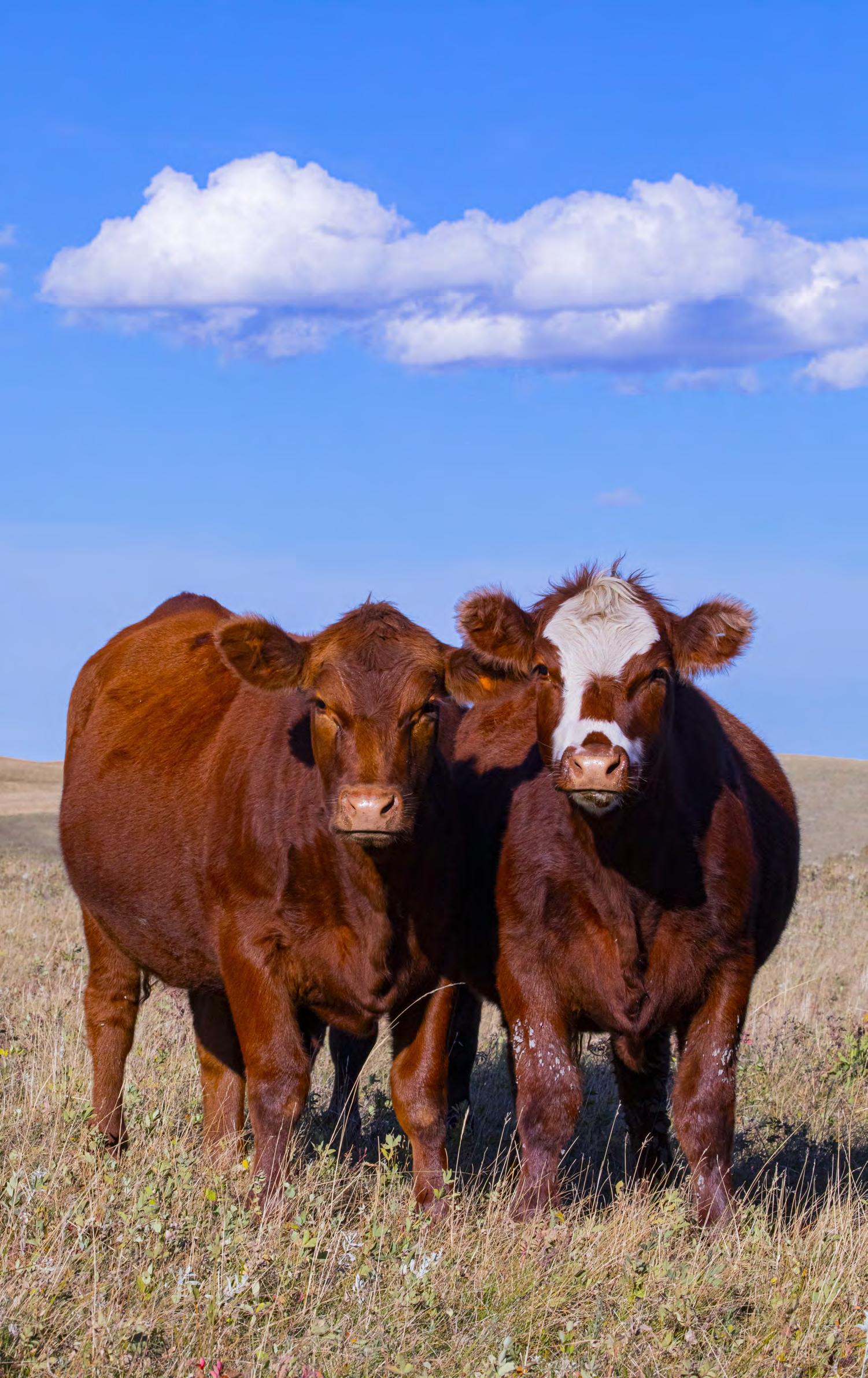E-Newsletter dsfsfa
 An update from MBP August 25, 2023 mbbeef.ca
An update from MBP August 25, 2023 mbbeef.ca



Government of Canada taking action to support drought-stricken Western producers’ Initial list of designated regions for Livestock Tax Deferral announced

(August 21, 2023 Agriculture and Agri-Food Canada News Release) The Minister of Agriculture and Agri-Food, the Honourable Lawrence MacAulay, announced an initial list of designated regions in British Columbia, Alberta, Saskatchewan and Manitoba where Livestock Tax Deferral has been authorized for 2023 due to extreme weather conditions.
Note: The 2023 initial list of designated regions for Manitoba includes Dufferin, Grey, Lorne, Louise, Macdonald, Montcalm, Morris, Norfolk-Treherne, North Norfolk, Pembina, Portage la Prairie, Rhineland, Roland, St. Laurent, Stanley, Thompson, Victoria, WestLakeGladstone, and Woodlands.
The Government of Canada recognizes the significant challenges livestock producers in Western Canada are facing due to exceptionally dry conditions. Compounded by subsequent years of drought, pastures and forage production are significantly impacted, leading to low feed supplies for livestock. The government stands with farm families during this difficult time and is taking action to respond.
The Government of Canada has also worked quickly with the governments of British Columbia, Alberta and Saskatchewan on joint AgriRecovery assessments to
examine the impacts of the drought and wildfires. Work with provinces is urgently progressing to finalize the AgriRecovery process and to determine any additional support required to cover the extraordinary costs incurred by producers.
The Livestock Tax Deferral provision allows livestock producers who are forced to sell all or part of their breeding herd due to drought or excess moisture to defer a portion of their income from sales until the following tax year. The income may be at least partially offset by the cost of reacquiring breeding animals, thus reducing the tax burden associated with the original sale.
As a preliminary list of prescribed drought and flood regions is usually completed in the early fall, designation of this provision earlier in the year helps provide assurance for producers as they make difficult herd management decisions. The Government of Canada will continue to monitor conditions across the country and will add other regions throughout the year if they meet the criteria.
Producers have access to a comprehensive suite of business risk management (BRM) programs that are the first line of defense for producers facing disasters, including AgriStability, AgriInsurance and AgriInvest. (continued on page 2)
Livestock Tax Deferral
The Government of Canada has already supported requests from British Columbia and Alberta for late participation in AgriStability, as well as requests from British Columbia and Saskatchewan to increase the interim payment rate under AgriStability from 50% to 75%. Minister MacAulay also highlighted federal support for British Columbia, Alberta and Saskatchewan to make a one-year adjustment to the AgriInsurance program to make more drought-damaged crops available for feed. This increases the amount of crops available for livestock producers in this time of need.
Quotes
“My heart goes out to farmers and ranchers who are affected by these extreme weather conditions. Early designation of the Livestock Tax Deferral provision provides assurance so they can make informed decisions to manage their herds. We have also enhanced support available under BRM programs and we will continue to work closely with provinces to get producers the additional support they need as quickly as possible.”
Quick facts
• The criteria for identifying regions for Livestock Tax Deferral is forage yields of less than 50% of the long-term average caused by drought or excess moisture. Eligible regions are identified based on weather, climate and production data, in consultation with industry and provinces.
• Under the Livestock Tax Deferral provision, to defer income, the breeding herd must have been reduced by at least 15%.
• In the case of consecutive years of drought or excess moisture and flood conditions, producers may defer sales income to the first year in which the region is no longer prescribed.
• Producers have access to a suite of business risk management (BRM) programs to help them manage significant risks that threaten the
viability of their farm and are beyond their capacity to manage.
• AgriRecovery is not a program but a framework which forms the basis by which federalprovincial-territorial governments can work together when natural disasters occur to assess the impacts and determine whether there is need for an AgriRecovery initiative. Initiatives focus on assisting with the extraordinary recovery costs to recover from a disaster and are not intended to address revenue losses, or duplicate support already available by existing government programs, including business risk management programs.
• The main steps of the AgriRecovery process are:
o request for an assessment: a provincial or territorial government requests that a joint assessment of a disaster event be initiated.
o assessment: a joint assessment is undertaken examine the disaster and impacts, determine if there are extraordinary costs and measure the capacity of existing programs to help producers recover.
o decision and authorities: findings from the assessment form the basis on which governments decide whether or not to implement an AgriRecovery initiative.
o agreement on the technical details: governments work together to finalize the technical details of the initiative.
o launch of the initiative: the initiative is launched and program materials are made available.
o payments: submitted applications are processed and payments are made to eligible producers.
• Agriculture and Agri-Food Canada has several resources and tools under Canada’s Drought Watch to help farmers understand the extent, severity and effects of drought and plan for potential future challenges.
• 2023 List of Prescribed Regions - Initial
• Livestock Tax Deferral Provision
– continued from page 1
- The Honourable Lawrence MacAulay, Minister of Agriculture and Agri-Food
Initial regions for Livestock Tax Deferral provision announced for western Canada
August 21, 2023
Calgary, AB – The Canadian Cattle Association (CCA) appreciates today’s announcement from the Honourable Lawrence MacAulay, Minister of Agriculture and Agri-Food declaring the initial regions eligible for the Livestock Tax Deferral (LTD) provision.

This provision is welcome news for many cattle producers impacted by detrimental weather conditions in British Columbia, Alberta, Saskatchewan, and Manitoba
However, we understand from conversations through CCA’s board and provincial members that some areas impacted by extreme weather this year have been overlooked. The announced list of designated regions is preliminary; more regions will likely be added as forage yield information becomes available. We encourage cattle producers to reach out to their provincial associations if their region has been impacted by adverse weather and should be included on the list of eligible regions. CCA will continue to advocate for all impacted producers to be eligible for LTD.
This year, wide-spread adverse weather conditions provide strong rationale for why we are seeking policy changes to the LTD provision. In CCA’s pre-budget submission, we are asking for key changes to help beef producers use the tool more effectively and reduce unnecessary bureaucratic delays.
The current framework has a few challenges diminishing the positive impact:
• LTD excludes producers who fall outside of the boundary lines of the prescribed region (yet feel the impacts of extreme weather) and those who are impacted by consecutive years of poor weather.
• LTD covers only ‘breeding animals’; when a severe weather event impacts the availability of feed, a producer must make decisions for the whole herd.
CCA is requesting that Finance Canada amend the LTD provision in the Income Tax Act (s. 80.3 (4)) to give producers the ability to self-elect rather than rely on a geographic determination. This would reduce the risk of delayed announcements, excluding access for producers who fall outside the boundary lines and those who are impacted by consecutive years of adverse weather.
Further, to ensure the modern business model of cattle production is reflected and ensure all producers can use this tool, CCA requests Finance Canada to amend the definition of ‘breeding animals’ in Section 80.3(1) of the Income Tax Act to include all classes of cattle, not just the breeding herd.
In addition to the LTD announced today, CCA continues to advocate for AgriRecovery support to come through as soon as possible.
For a complete list of the eligible early designation counties, click here.
For further information, contact: Michelle McMullen Communications Manager Canadian Cattle Association 403-451-0931| mcmullenm@cattle.ca
Industry Update
www.cattle.ca
The Canadian Cattle Association is the national voice for Canada’s beef cattle industry representing 60,000 beef farms and feedlots
Agency Elects New Members and Marketing Committee at AGM
Calgary, AB (August 15, 2023) - The Canadian Beef Check-Off Agency (the Agency) is pleased to announce the Agency Board, following the Annual General Meeting on August 15, 2023.
The 2023/24 Agency Members have been announced as:
Producers:
Andrea Van Iterson, British Columbia
Jeff Smith, Alberta
Sheila Hillmer, Alberta
Chad Ross, Saskatchewan
Mary Paziuk, Manitoba
Jack Chaffe, Ontario
Sylvain Bourque, Quebec
Trevor Welch, New Brunswick
Larry Weatherby, Nova Scotia
David Francis, Prince Edward Island
Julie Mortenson, Young Cattlemen’s Council
Canadian Meat Council:
Russ Mallard, Atlantic Beef Products
Andre Forget, Montpak
Jeff Cline, Cargill
John Curtis, St. Helen’s Meat Packers
Retail and Foodservice:
Steve Christie, Sysco Canada
I.E. Canada:
Coral Manastersky, Maple Leaf Foods
Chair Jeff Smith is excited to continue delivering measurable results for producers.
“Our industry invests a tremendous amount of money into itself through the beef check-off and import levy in Canada, and we’re working very hard on behalf of producers to ensure that those dollars bring a strong, measurable return,” said Smith.
At the meeting, Agency General Manager Melinda German shared an update focused on the Agency’s programming, including the focus on education and compliance.
“Our inspection program continues to ensure that everyone across the country is on a level playing field,” said German. “Our compliance and education program continues to pay for itself as we help producers, dealers, auction markets and others understand not only how the system works, but the value of the check-off system in Canada.”
Joining Smith on the Agency’s Executive Committee will be Trevor Welch of New Brunswick as Vice Chair, Larry Weatherby of Nova Scotia as Governance Chair and Sheila Hillmer of Alberta as Finance Chair.
The Agency’s Marketing Committee also elected two Members-at-Large this year: Mike Guest of Saskatchewan, and Jim Clark of Ontario.
The Marketing Committee is responsible for planning and establishing Canada Beef’s strategic, business and operational goals and objectives and for the overall management and operation of the business and affairs.
The Marketing Committee has been announced as:
Elected:
Cam Daniels, Harmony Beef
Clay Holmes, Intercity Packers
Mike Guest, Western Prime Meat Processors
Jack Chaffe, Beef Farmers of Ontario
Chad Ross, Saskatchewan Cattlemen’s Association
Jim Clark, Ontario Corn Fed Beef & Ontario Cattle Feeders Association
Agency Elects New Members and Marketing Committee at AGM
Appointed:
Jeff Cline, Canadian Meat Council
John Curtis, Canadian Meat Council
Russ Mallard, Canadian Meat Council
Andre Forget, Canadian Meat Council
Coral Manastersky, I.E. Canada
Steve Christie, Retail and Foodservice
Jennifer Haley, Veal Farmers of Ontario
The Marketing Committee also elected their Executive Committee, including Russ Mallard as Chair, Stephen Christie as Vice-Chair and Jack Chaffe as Finance Chair.
“I look forward to chairing the Marketing Committee again this year as Canada Beef celebrates its 50th anniversary. The coming year will bring challenges and opportunities for the Canadian beef industry. Fortunately, we have an excellent team at Canada Beef and the Marketing Committee is ready to assist as they promote the advantages of high-quality Canadian beef in domestic and international markets,” said Mallard.
Canada Beef President Michael Young is confident that the direction provided by the Marketing Committee puts Canada Beef in a great position to capitalize on old and new strategies.
“Canada Beef’s focus on a mix of innovation and proven strategies to expand the reach of beef and veal with consumers and foodservice really hit its stride this year. The guidance and support from the Marketing Committee has been appreciated and we are ready for another great year of promoting and marketing Canadian beef and veal at home and abroad,” said Young.
The Agency would like to recognize Kirk Jackson
of Quebec, who finished his ten year term at the completion of this AGM. Kirk began his Agency Membership in 2013, and was an integral part of helping drive further administrative transparency of the Agency. He spent four years as the finance chair, and developed a strong culture of fiscal transparency as well. The Agency and it’s Members would like to thank Kirk for his dedication to the industry for all Canadian beef producers.
The Agency’s 2022/23 Annual Report is available online at www.cdnbeefcheckoff.ca.

Minister Ng concludes successful meetings in Indonesia with ASEAN economic ministers
(August 22, 2023 Global Affairs Canada News Release) The Honourable Mary Ng, Minister of Export Promotion, International Trade and Economic Development attended the 12th Association of Southeast Asian Nations (ASEAN) Economic Ministers (AEM) – Canada Consultation, in Indonesia.
Ahead of the AEM meeting, Minister Ng met with Luhut Binsar Pandjaitan, Indonesia’s Coordinating Minister for Maritime and Investment Affairs, to hold the first meeting of the Canada-Indonesia Economic Task Force, which was agreed to during Minister Ng’s last visit to Indonesia. The ministers agreed to advance shared priorities such as comprehensive economic partnership agreement (CEPA) negotiations, the development of a green airport in North Kalimantan, strategic investment in infrastructure projects and cooperation on food security and agriculture.
While in Jakarta, Minister Ng also met with Yaqut Qoumas, Indonesia’s Minister of Religious Affairs, and advocated for restored access to the Indonesian market for Canadian halal products, including beef, and the recognition of Canadian halal certification bodies.
Minister Ng also met with Airlangga Hartarto, Indonesia’s Coordinating Minister for Economic Affairs, and with Zulkifli Hasan, Minister of Trade to advancing negotiations towards a CanadaIndonesia CEPA.
In Semarang, Minister Ng attended the 12th AEM – Canada Consultation. She reaffirmed Canada’s support for ASEAN centrality and shared interest in a peaceful and prosperous Indo-Pacific region, highlighting opportunities for cooperation under the ASEAN Outlook on the Indo-Pacific. Minister Ng thanked ASEAN and its member states for their ongoing support
in finalizing the ASEAN-Canada Strategic Partnership this year and advancing negotiations toward a Canada-ASEAN free trade agreement.
She also had bilateral meetings with international partners including Kao Kim Hourn, Secretary-General of ASEAN whom she thanked the Secretary-General for his support in advancing negotiations toward a Canada-ASEAN free trade agreement.
Minister Ng thanked Indonesia for hosting the 2023 ASEAN Economic Ministers Meeting.
Quotes
“As we grow trade with key markets across the Indo-Pacific, Canada will continue to work with ASEAN partners to deepen trade ties that will benefit Canadian businesses and workers, create good jobs across the country and generate strong, inclusive, and sustainable economic growth. My time in Indonesia was an excellent opportunity to strengthen Canada-ASEAN relations and reinforce Canada’s support for a free, open and inclusive Indo-Pacific, with ASEAN at its core.”
- Mary Ng, Minister of Export Promotion, International Trade and Economic Development”
Quick facts
• Established in 1967, ASEAN comprises 10 Southeast Asian States: Brunei, Cambodia, Indonesia, Lao People’s Democratic Republic Malaysia, Myanmar, the Philippines, Singapore, Thailand and Vietnam. In 2022, ASEAN admitted Timor Leste in principle as the 11th member of ASEAN and granted observer status.
• ASEAN is Canada’s fourth-largest trading partner globally and second-largest trading partner in the Indo-Pacific in terms of merchandise trade. With a combined GDP of almost $5 trillion and a population of more than 670 million in 2022, ASEAN represents the world’s fifth-largest economy and third-most populous consumer market.
Minister Ng concludes successful meetings in Indonesia with ASEAN economic ministers
• With a population of about 275 million and a GDP of $1.7 trillion in 2022, Indonesia is Southeast Asia’s most populous country and has its largest economy, creating significant trade and investment opportunities for Canada.
• Total bilateral merchandise trade between Canada and ASEAN reached $40.7 billion in 2022 while services trade amounted to $6.8 billion in 2021 and these numbers are expected to continue growing.
• Canada and ASEAN launched negotiations toward a free trade agreement in 2021 and will
be holding the fifth round of negotiations in September, 2023.


• Canada supports ASEAN capacity-building in trade policy and economic development through the Expert Deployment Mechanism for Trade and Development and the Canadian Trade and Investment Facility for Development.
• In August 2022, Minister Ng announced the creation of an ASEAN-Canada Plan of Action Trust Fund
Agroclimate Impact Reporter (AIR) Survey is Now Open for August
(Information From Agriculture and Agri-Food Canada)

The Agroclimate Impact Reporter (AIR) is a tool to help connect Agriculture and Agri-Food Canada (AAFC) with people in Canada's agricultural community. AAFC relies on its network of AIR volunteers to provide information regarding agroclimate impacts on farm operations across the country.
The AIR network provides valuable and reliable data that are mapped and used in the assessment and development of policies and programs including AgriRecovery and the Livestock Tax Deferral Provision, which can provide assistance to the industry during extreme weather and climate conditions and events.
AAFC is currently collecting AIR reports for the month of August To let the Science and Technology Branch of AAFC know what the conditions are like this month in your area, please respond to one of the links below:
English
French
To learn more about AIR, follow this link.
To view previous Agroclimate Impact maps, follow this link. Or see some of the other resources we produce on the AAFC Weather and Drought home page. Thank you for your participation, and have a great weekend!
Livestock Estimates as of July 1, 2023
On August 23, 2023 Statistics Canada released its updated livestock estimates as of July 2023.
Key highlights from the Manitoba perspective as of July 1, 2023 versus July 1, 2022:
• There were 5,000 fewer head on all cattle operations in the province (includes dairy)
• There were 6,600 fewer head on beef operations
• There were 7,400 fewer head on cowcalf operations
• There were 6,800 MORE head on feeder and stocker operations
• There were 6,000 fewer head on feeding operations.
Key highlights from the national perspective:
• Canadian cattle inventories have been on a downward trend since July 2021.
• Drought conditions and tight feed supply in Western Canada, along with reductions in processing capacity in Eastern Canada, continued to put pressure on the livestock sector.
• Canadian farmers held 12.2 million cattle and calves on their farms on July 1, 2023, down 1.5% from the same date the previous year. Alberta held the largest cattle inventories among the provinces on July 1, contributing 43.2% to the national total, followed by Saskatchewan (20.5%) and Ontario (13.2%).
• Canadian cattle producers retained less breeding stock on July 1, 2023, with year-over-year decreases observed in all

breeding stock categories. Meanwhile, producers held more feeder heifers (+1.8%) but fewer steers (-0.3%) compared with July 1, 2022.
• From January to June 2023, the total disposition of cattle and calves was down 4.5% compared with January to June 2022. During the same period, cattle and calves slaughter declined 4.6% to 1.8 million head, and international cattle and calve exports decreased 16.3% to 344,900 head. Tight supply and strong prices of cattle for slaughter contributed to these declines.
For more information go to: https://www150.statcan.gc.ca/n1/dailyquotidien/230823/dq230823d-eng.htm
What are growing conditions like in your area?
Good or bad, MBP would appreciate your feedback. Please send comments and/or photos to: info@mbbeef.ca
































2022-23 BCRC Year In Review









2022-23 BCRC Year In Review www.BeefResearch.ca 6


















2022-23 BCRC Year In Review
















































































































































































































































